Rediff.com's Prasanna D Zore and Hitesh Harisinghani visits Anand Nagar Colony, a scenic hilltop in Mumbai's northern suburb of Malad, that was reduced to soot and ash after a fire in one of the houses spread from the bottom to the top of the hillock, causing several cylinder blasts reducing thousands of slums to ashes and rendering homeless its residents.
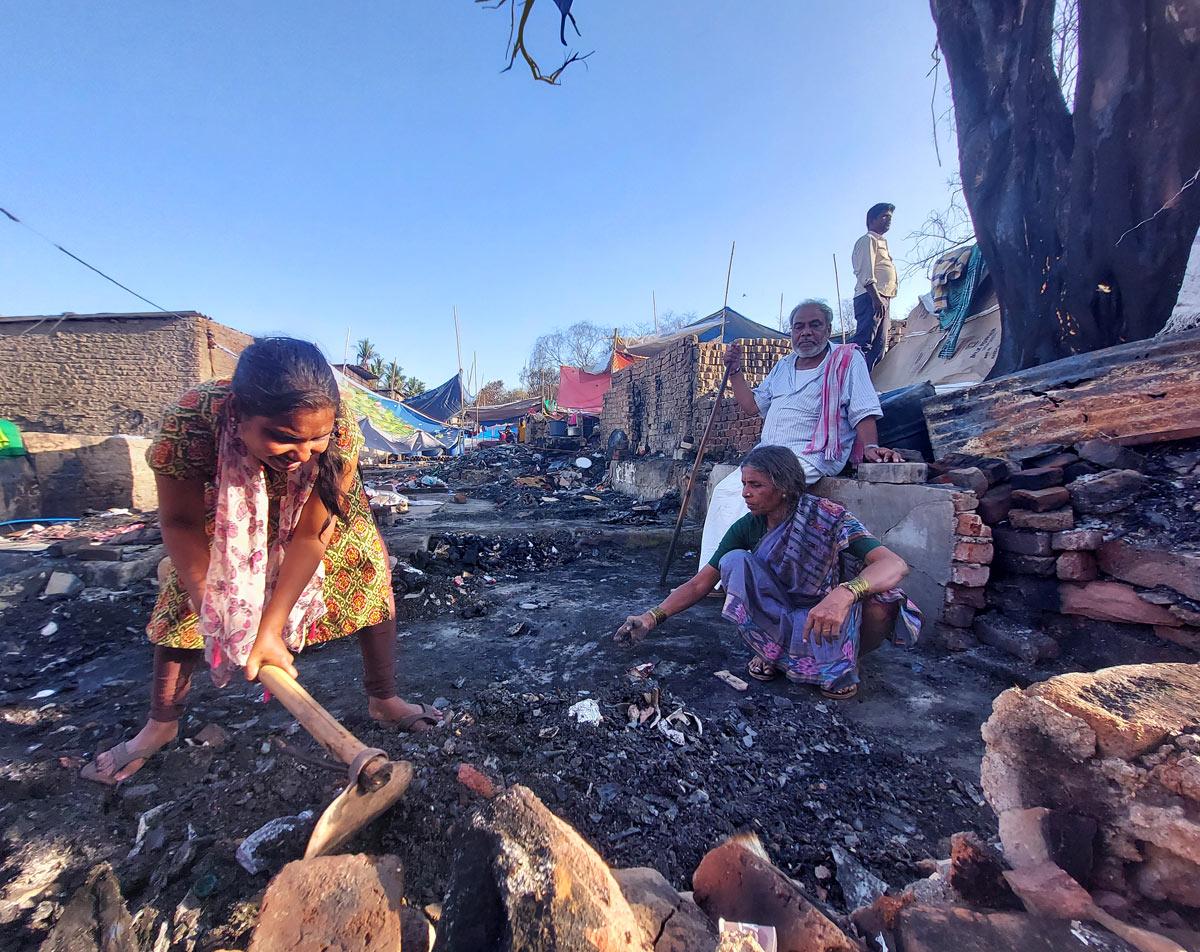
It was sometime between 4.50 pm and 5 pm on March 13 and Ashamma Pausheli, a resident of Anand Nagar, a slum settlement located atop a scenic hillock at Malad's Kurar village, was busy with her routine household work.
Suddenly, she heard children shouting 'Fire, fire'.
She could easily make out the cries were coming from just outside her home -- a ramshackle makeshift structure that had loosely mounted bricks for walls and plastic tarpaulins for the roof.
No sooner did she rush out of her home she could see smoke billowing out of her neighbour's home -- another ramshackle structure just like Ashamma's.
Before the combustible plastic and the fire that was greedily consuming it could engulf her home in flames -- and later to ashes and soot -- Ashamma grabbed her son's two children and her husband -- an ailing Bhimappa, the proud owner of the structure he called home for almost 30 years -- and took them to safety.
If it were not for Ashamma's instincts and quick response, her two grandchildren, Bhimappa and she herself would have been quickly devoured by the fire, which completely charred anywhere between 1,024 to 2,970 huts (the police panchnama recorded 1,024 hutments as completely burnt, while Rajesh Mane, a resident of Anand Nagar states he has a list of 2,970 dwelling units atop the hillock and, according to him, more than 90 per cent of them were completely burnt).
"I saw the flames entering inside my homes and ran for my life," says Ashamma, who claims the first instance of fire was witnessed by her at her neighbour's house.
When Ashamma was running away to safety with her family she did not realise that within two hours the entire hillock would turn into an inferno fed by exploding cylinders and winds blowing up the hillock.
Her home is at the base of the foothill separated by a well-built concrete wall -- a sort of 'boundary' between her slum colony and the pucca houses -- Satbir Yadav Chawl -- that dot the other side of the wall, which fortunately, did not face any brunt of the fire or the exploding cylinders.
"I don't know what happened later that evening," recalls Ashamma recalling the tragic events even as she and her grandchildren clear the ash and soot from the floor where their home stood just about a week ago.
While the fire and wind -- the two elements of nature that has helped spawn humanity and its progress -- did play their role in destroying lives and homes of these people, it were the exploding cylinders -- the metallic cooking gas containers called batlas in local lingo -- that wreaked absolute devastation.
It must be around 4.55 pm when I stepped out of my home to comb my hair," says Asha Anant More, whose home is located almost at the middle of the hillock, overlooking Ashamma's home below and a few concrete towers and a small hill beyond.
"I was aghast to see the fire engulfing the tree below (near Ashamma's home). And suddenly it began raining fire and metal in all directions," says More describing how the fire caused cylinder blasts due to which pieces of fire-covered-metals were flung upwards.
Unbelievably, the fire balls flying out from exploding cylinders were thrown only in the upward direction; these correspondents saw no signs of damage atop the asbestos covered roofs or signs of fire in the pucca houses of Satbir Yadav Chawl separated from Ashamma's home by just a small wall.
"The skies were cloudy that evening. I prayed desperately for rains (the meteorology department did forecast rains during that period; it rained, however, on the intervening night of March 20 and 21 when these correspondents visited the slum colony further adding miseries to the lives of the people who were trying to salvage whatever they could from their charred homes amid smell of burnt metals) but it just rained fire and hell on us," says More, who resides in one of the very few concrete houses surrounded by a sea of tarpaulin homes.
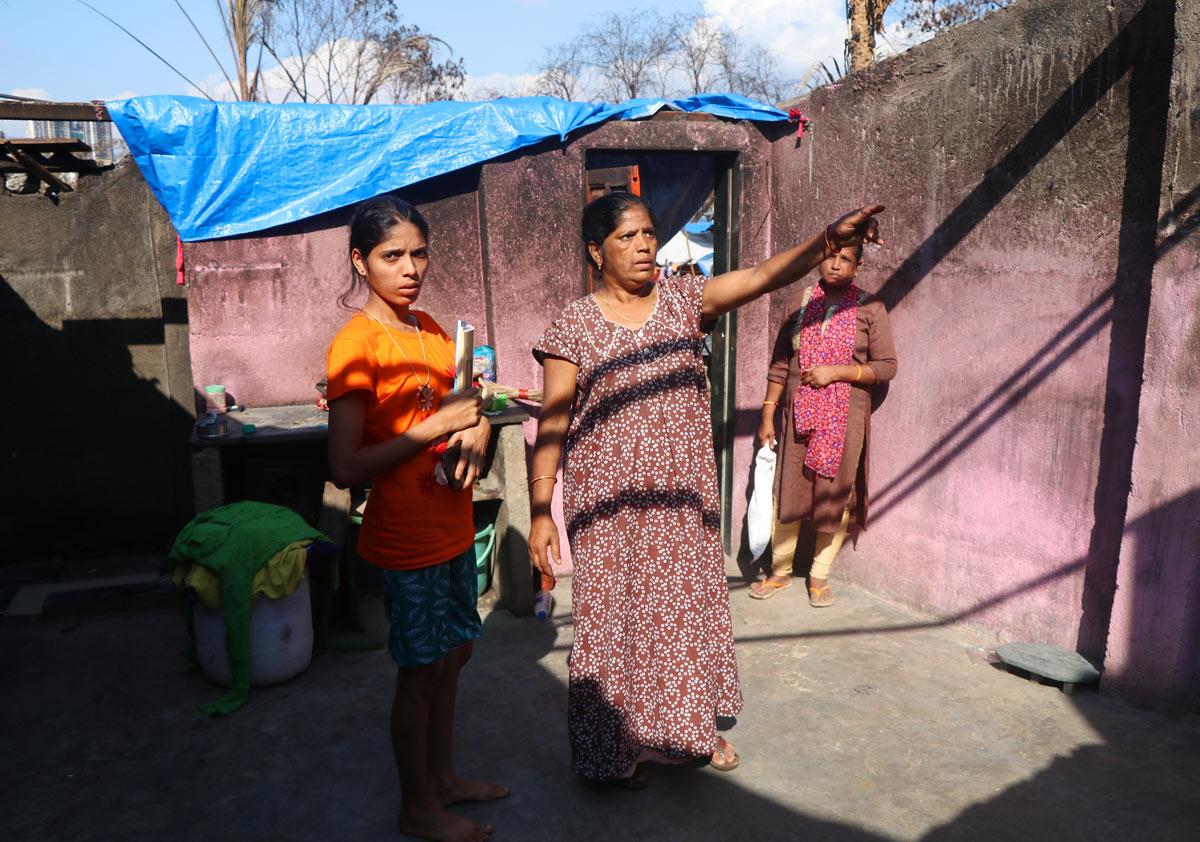
Only the black walls are standing now. The cylinder blast just blew away the cement sheets," adds More, pointing towards the sky from inside her home.
Heaps of clothes and whatever else her family could save were stacked neatly inside a small plastic drum just under the place where her kitchen once stood.
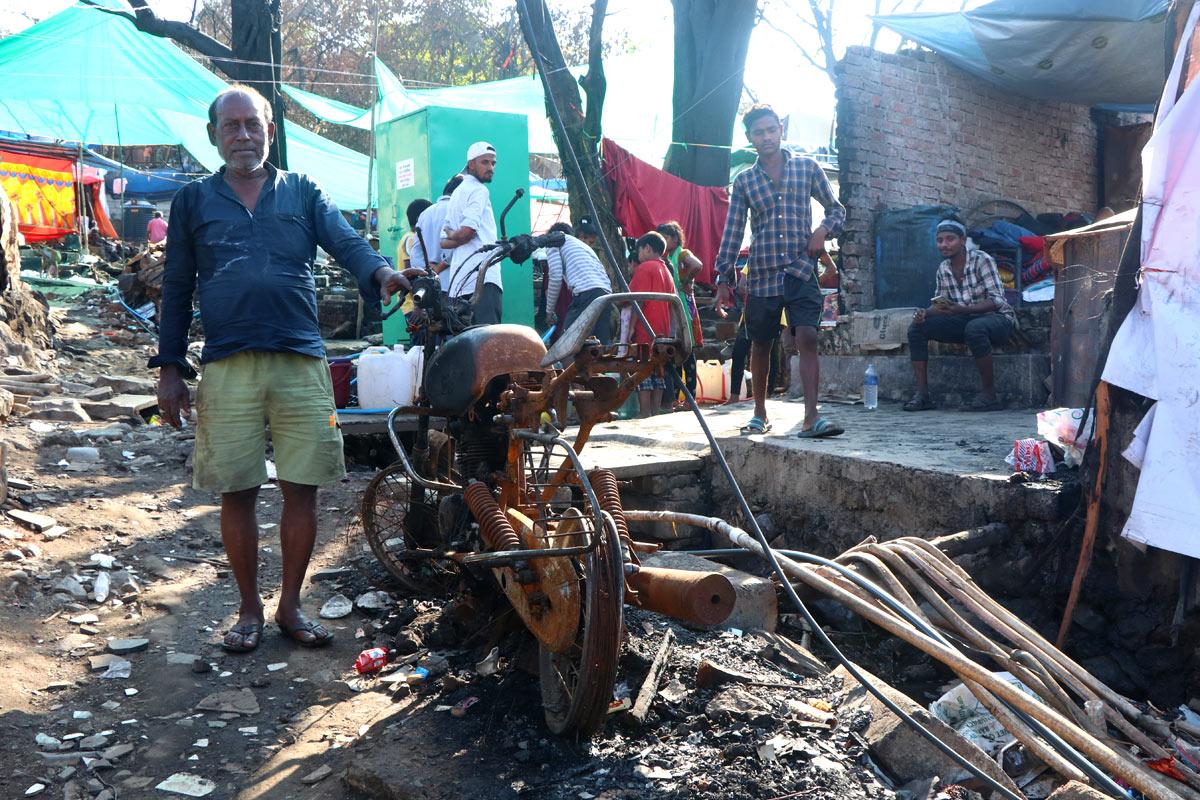
It is not difficult to miss the charred remains of motorcycles; their owners posing gallantly in front of their prized possessions...
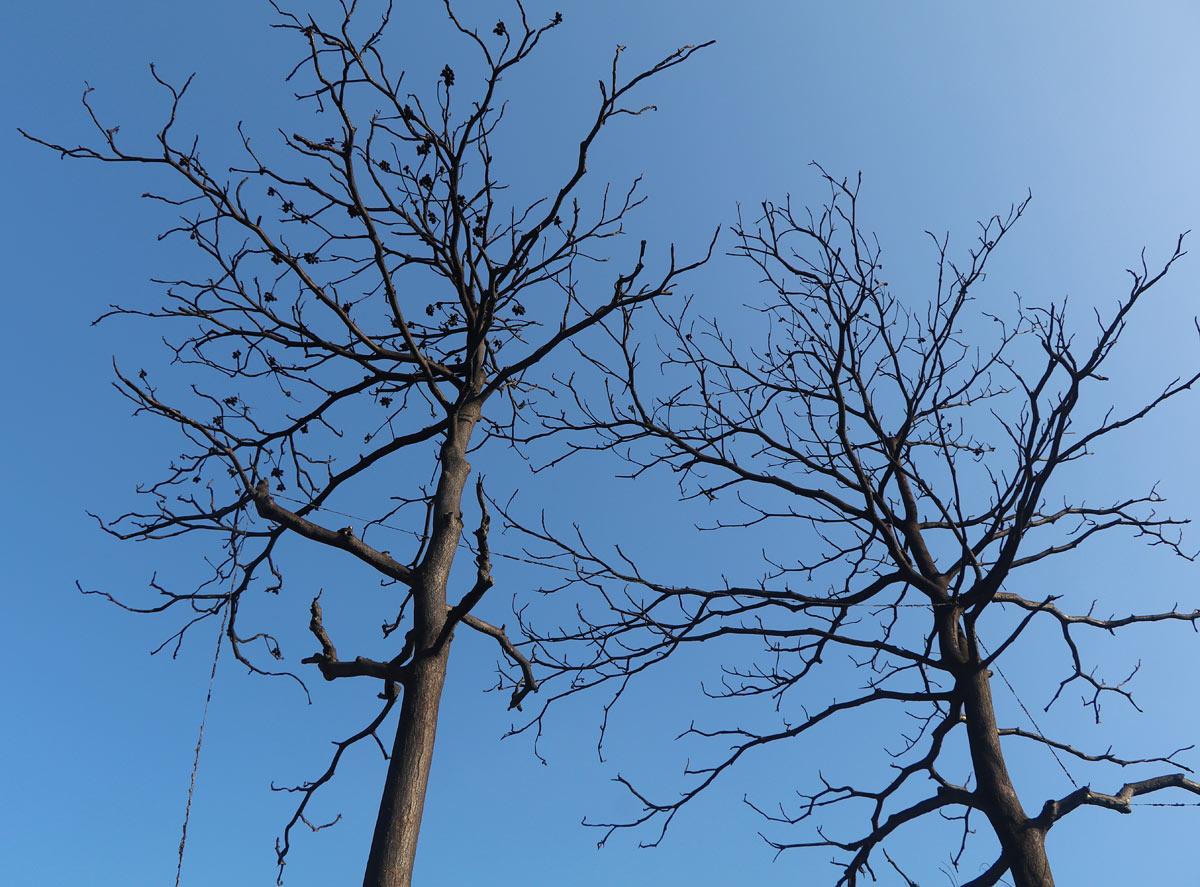
It is not difficult to miss the soot-covered, leafless trees under whose green canopies the residents of this slum colony would gather for silly chats or heated debates...
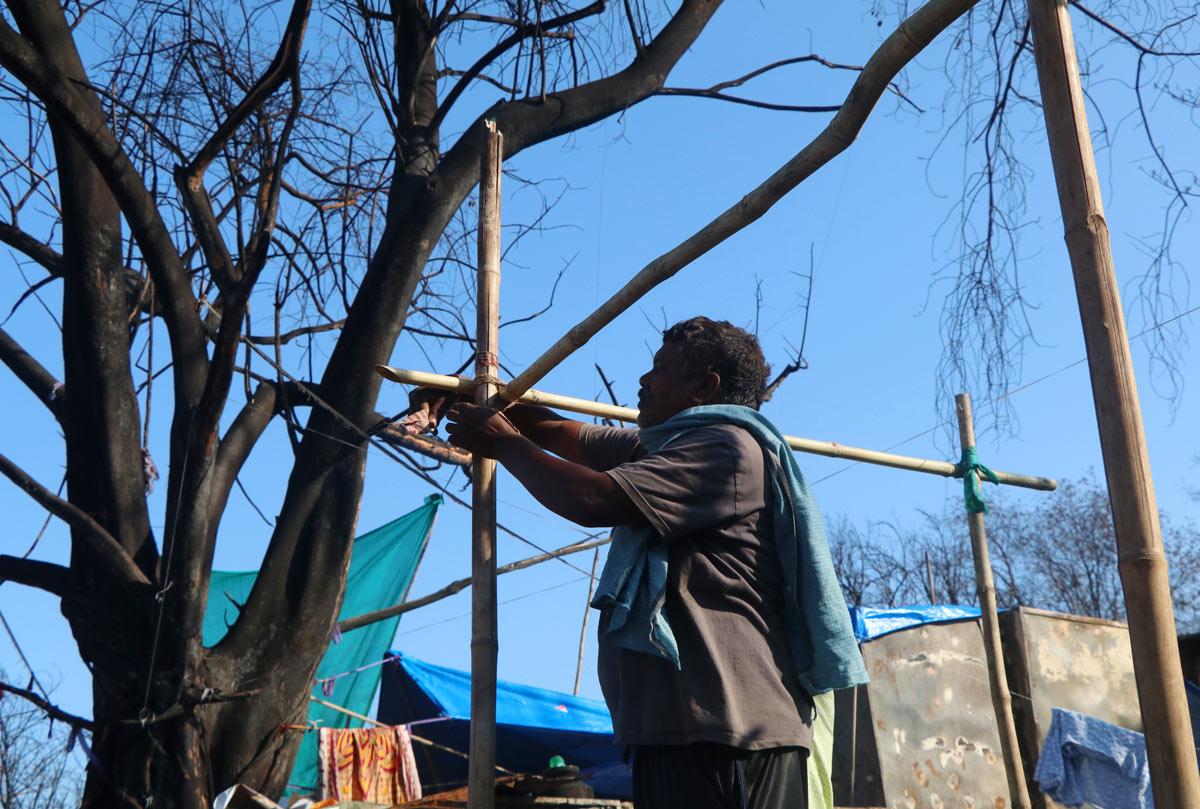
It is not difficult to miss people rebuilding their homes, one bamboo by another under the benign gaze of a leafless, burnt-down tree...
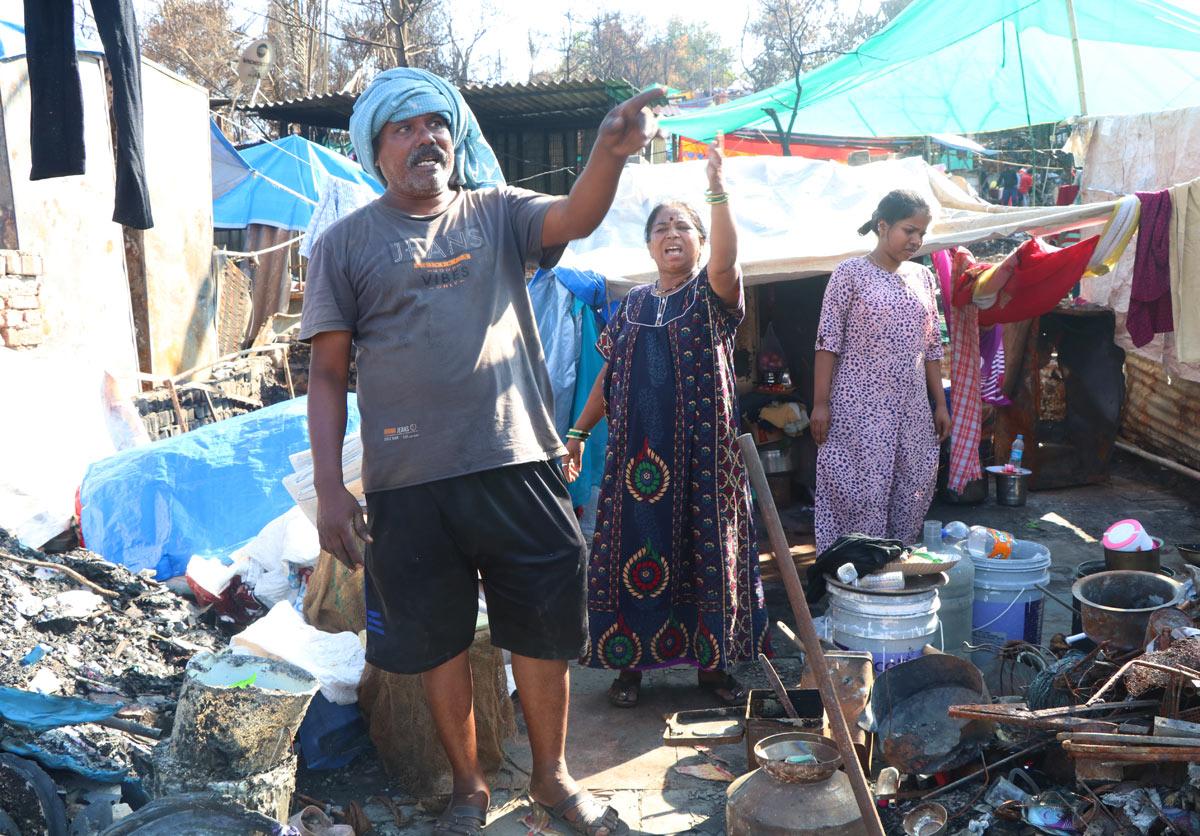
It is not difficult to miss people talking about loss of their material possessions...
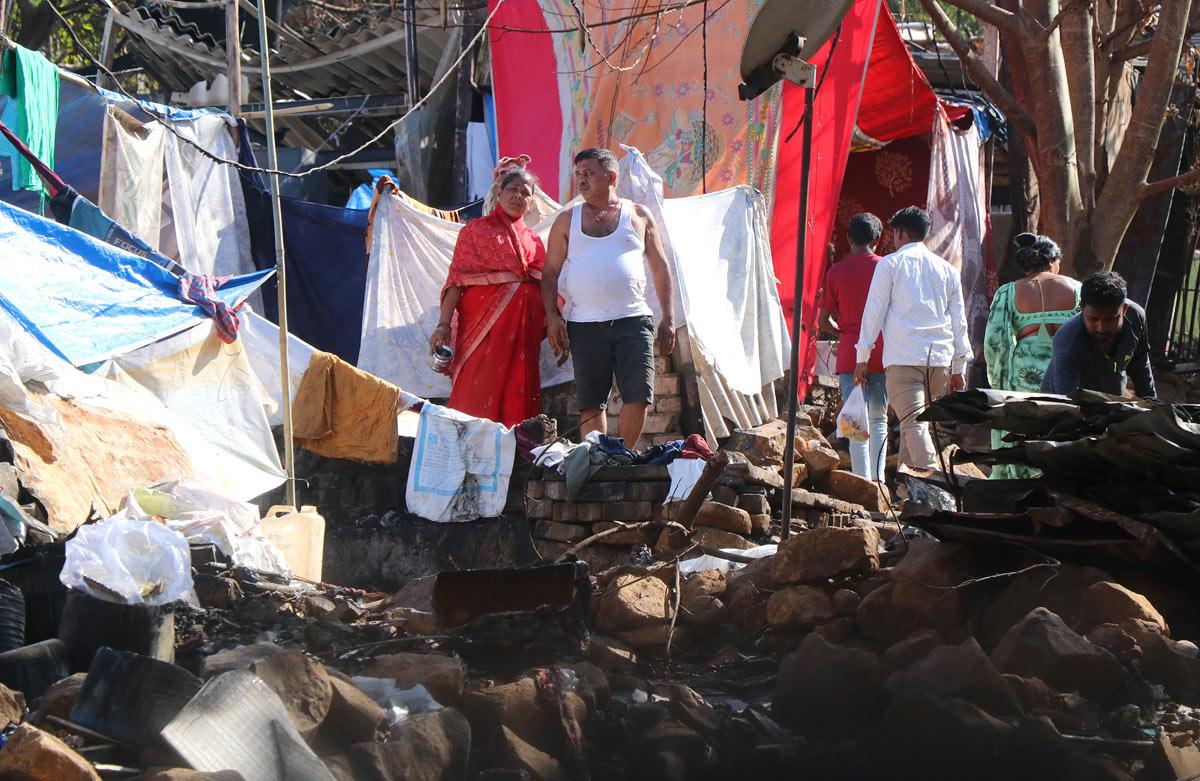
It is not difficult to miss people staring blankly, helplessly at their shattered lives and homes...
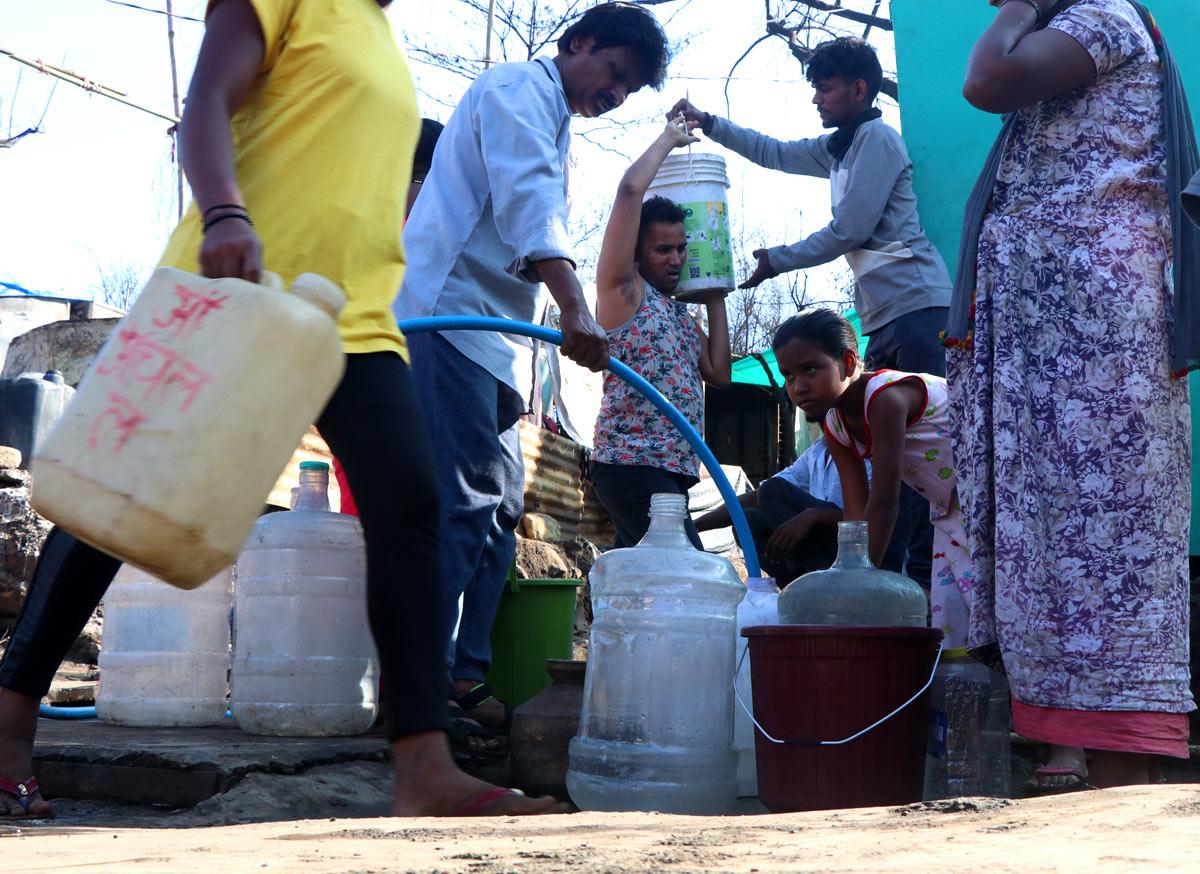
It is not difficult to miss people going about their humdrum lives... filling water, which thankfully, has been available 24x7 after the cylinder blasts...
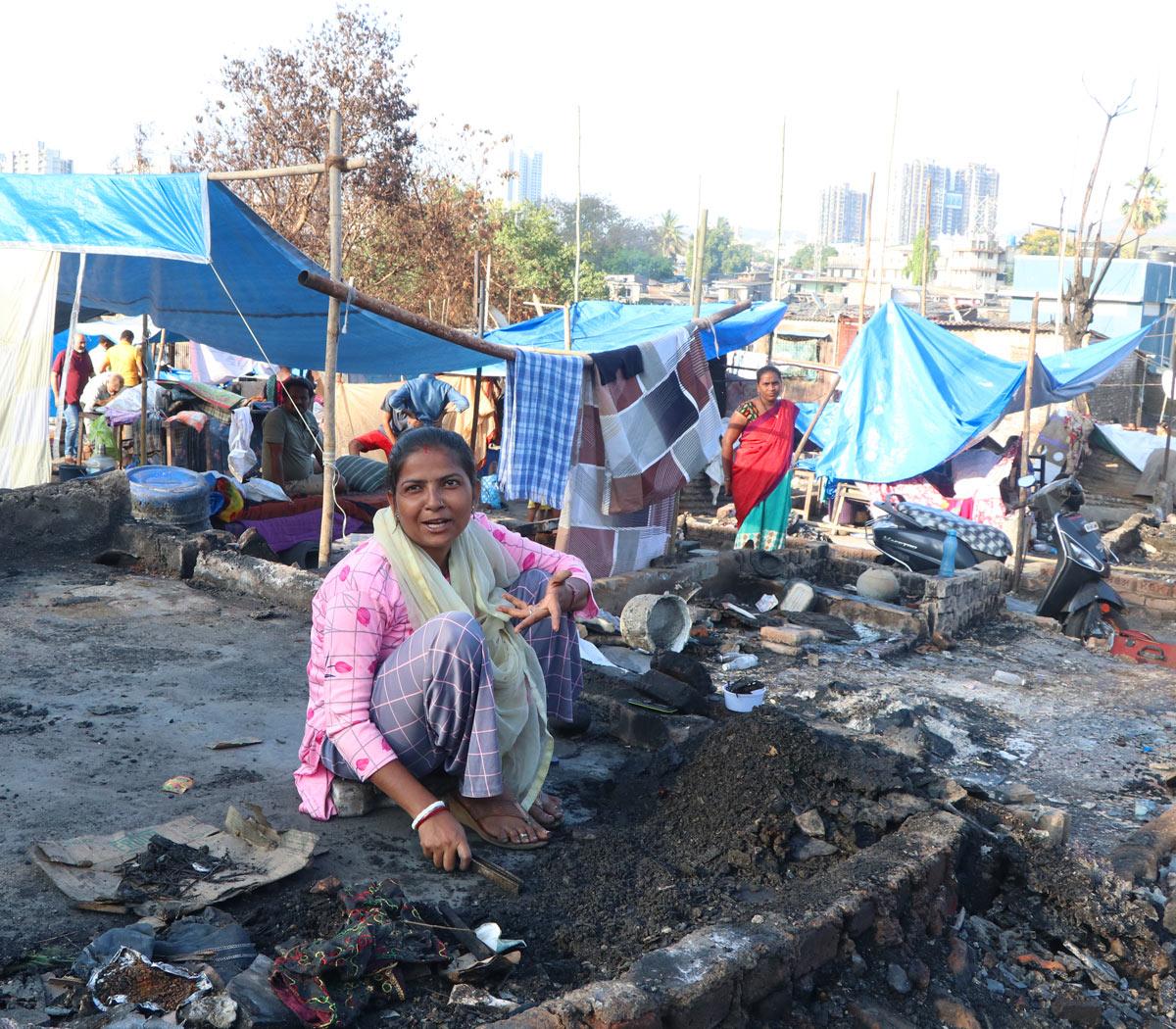
It is not difficult to miss people scouring the earth of their homes in search of metal scraps, even nails that could be sold as scrap ("jo 10-20 rupaye mil jaye wohi sahi," says this lady who was picking up nails from the earth using a metal prong)
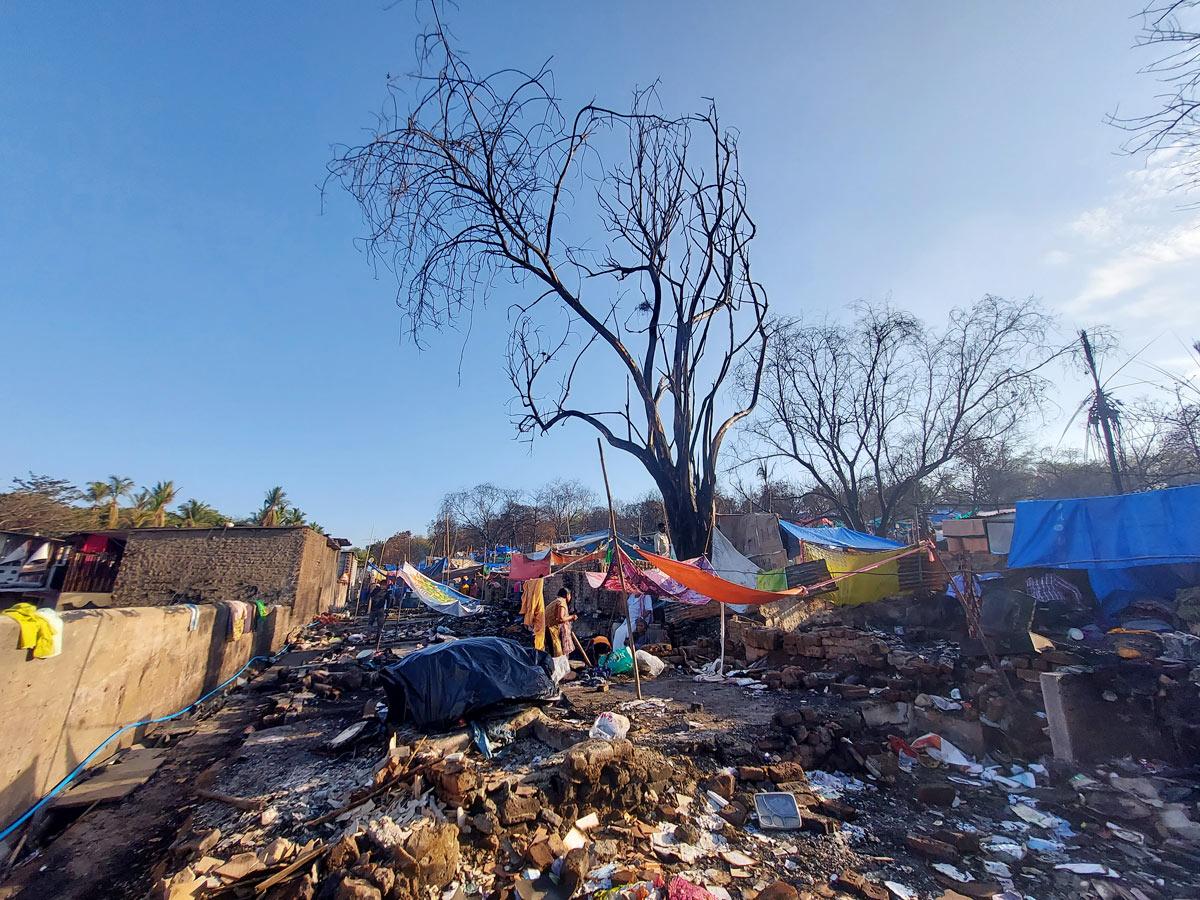
It is not difficult to miss the concrete wall, the so-called 'boundary', the lonely, burnt, black tree overlooking the pucca houses, unable to sway with the gay winds as if standing in solidarity with those whose lives have been shattered...
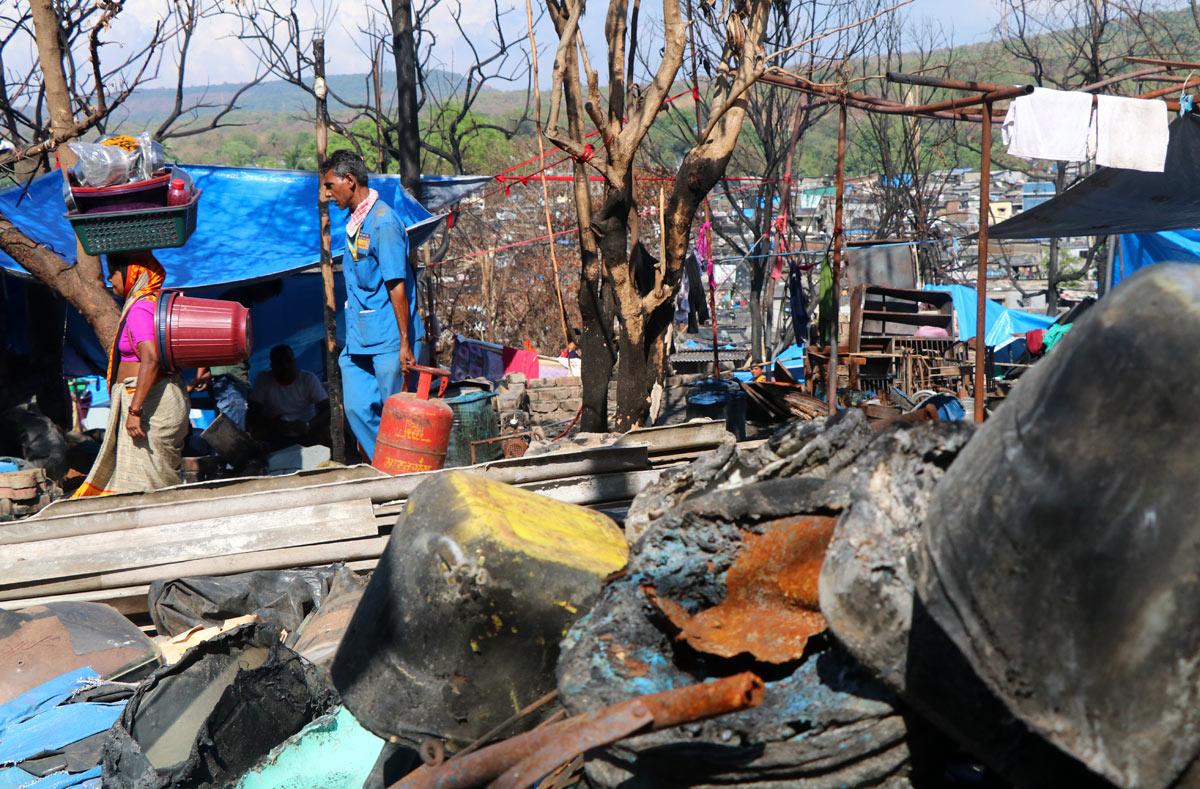
It is not difficult to miss the cylinder-wallah (the person who home delivers cylinders), and the lady seeking to find some business selling buckets...
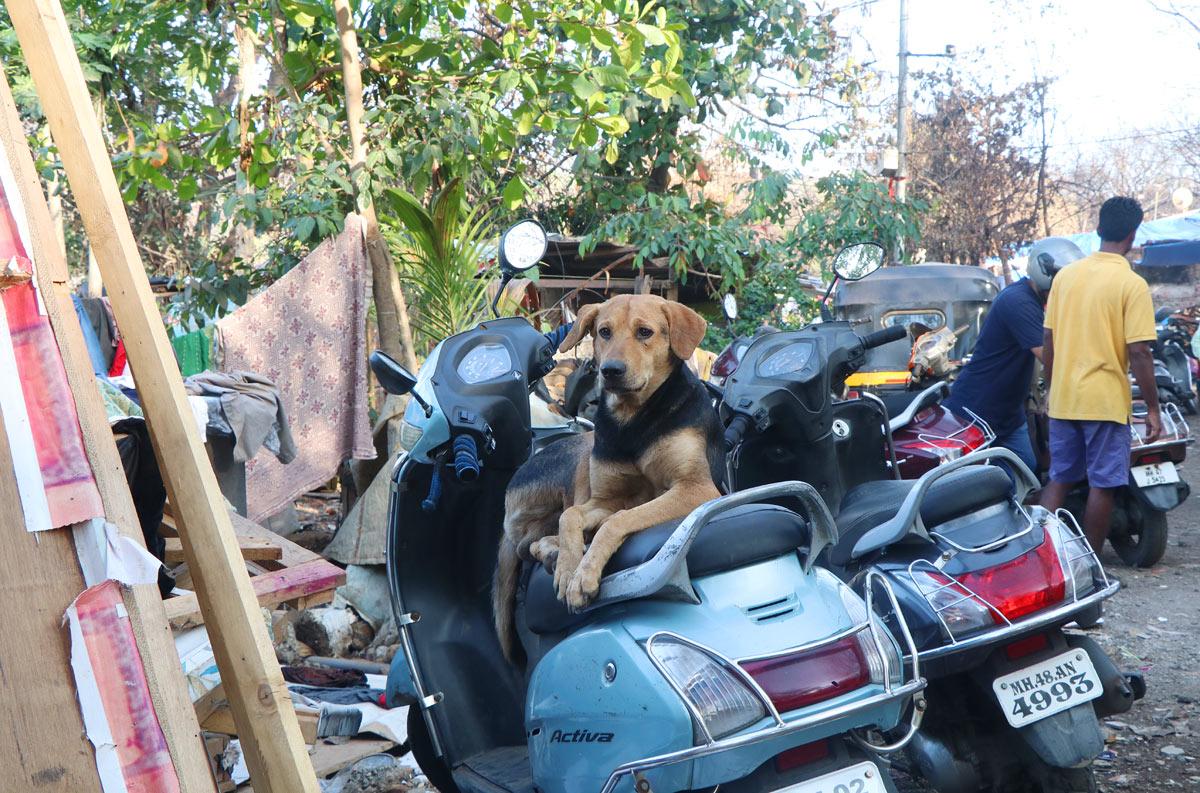
And, it is not difficult to miss this cute fellow coolly supervising the goings on...
***
And then there is Rajesh Vishwanath Mane, a conservancy contract worker employed with the BrihanMumbai Municipal Corporation. He is the epitome of a metaphor encompassing the spirit of all those who call themselves the children of lesser god but who exhibit the human spirit that overcomes all sorrows and tragedies.
In his early 30s, Rajesh greets us outside the Hanuman temple -- midway between More's and Ashamma's home -- with an easy, unarming smile.
"Arre media wale aa gaye (look, the media people are here)," he announces to his friends who are idling away their time at the temple, often a place where the youth hang around.
"Let's show them around," says a friend of his, who we later discover is a relative of Ashamma (seen in a white kurta in the video).
Amid the rubble and ruin, their personal losses, amid living and sleeping under the temple's roof for more than seven days now (these reporters visited Appa Pada on March 21), despite their frustrations and tribulations, the two avid youngsters are offering to help the "media-people".
Rajesh, a typical young man brimming with confidence is garrulous as he leads the "media people" to the house of the only casualty -- one Ashnappa, who worked as a mason and hailed from Yadgir in Karnataka's Gulbarga district -- of the numerous cylinder blasts that rocked the Anand Nagar settlement to dust and ash.
Rajesh -- just for the record -- also hails from Karnataka's Bidar, speaks Marathi, unlike Ashnappa who spoke Kannadiga. In fact, most of the residents of the Anand Nagar colony -- a mix of Marathi and Kannadiga speaking people -- hail from Karnataka.
When the fire broke out on March 13 and cylinders flew across the evening sky and fell upon their homes, residents of Anand Nagar -- without bothering about who hailed from Bidar and who hailed from Gulbarga -- were helping each other run to safety, helping each other take away as many batlas away from fire's way.
Lest, this be misconstrued as a political comment a disclaimer is in place that mentioning the roots of residents of the Anand Nagar colony has got nothing to do with the politicians from Maharashtra and Karnataka fighting over language, borders and other survival-threatening issues.
"Jaloon khaakh jhala sagala (everything is burnt to ashes); aapan kaay karu shakto? (there is nothing much we can do)," says Rajesh standing in front of his house and pointing towards Ashnappa's house who stayed in front of his house near the foothill of the hillock.
"We are wise enough to know that no help will be forthcoming. We know how much we matter (to the politicians)," says Rajesh when asked if any help has been forthcoming from political parties.
"They come only before the elections promising us the moon. They vanish once the results are out," says Bhimappa wryly even as he and his family contemplate about way to rebuild their home and his granddaughter helps Ashamma clear the ground off the dark memories of March 13.











 © 2025
© 2025